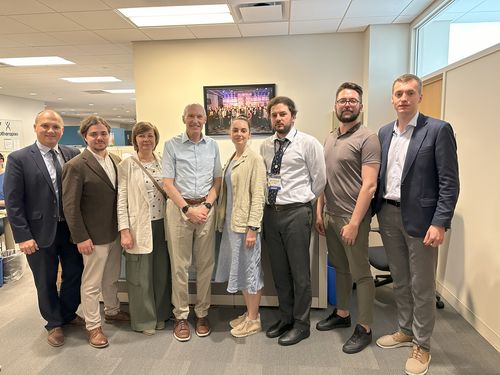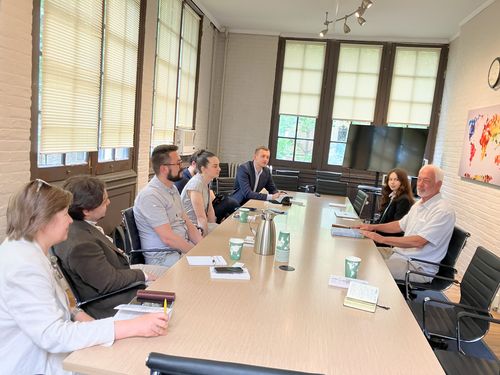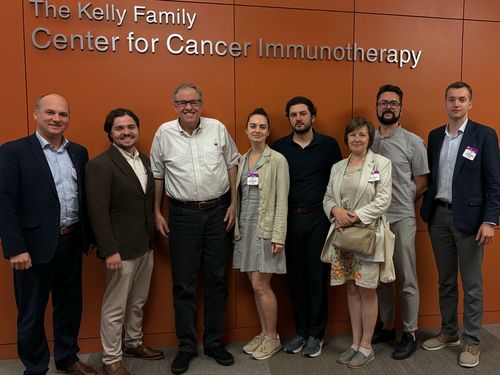Ukrainian Doctors Seek Advanced Cancer Treatment Knowledge Amidst War
In early June 2024, despite the backdrop of ongoing war in their homeland, a group of doctors and medical specialists from Ukraine's National Ohmatdyt Children's Hospital visited the University of Pennsylvania (UPenn) and the Children's Hospital of Philadelphia (CHOP) to learn about cutting-edge cancer treatments, particularly CAR-T cell therapy.
UPenn is a pioneer and global hub for cell and gene therapy, which is currently unavailable in Ukraine. The university's prominence in this field dates to 2010 when Drs. Carl June and Stephen Grupp used genetically modified immune T-cells to retrain a patient's own immune cells to attack cancer. Some of the earliest children and adults treated have experienced long-lasting remissions of 10+ years.
The Ukrainian delegation included Dr. Oleksandr Istomin, Ohmatdyt pediatric hematologist; Dr. Olena Nesterenko, Ohmatdyt transfusion medicine specialist; Mr. Yevhen Hrohul and Dr. Olena Perepelitsyna, Ohmatdyt biologists; Dr. Arman Kacharian, the Ministry of Health of Ukraine official, Dr. Igor Tokarchuk, cell biology researcher; and Dr. Rostyslav Semikov, founder and director of Peace and Development Foundation, and Audubon Bioscience.
Dr. Semikov explained the initiative's importance: "Despite the ongoing war, Ukrainian healthcare professionals are determined to improve patient outcomes, particularly for those with hematological malignancies. Ohmatdyt National Children's Hospital in Kyiv has become a central hub for patients who need chemotherapy and stem cell transplantation. Now, Ohmatdyt wants to move forward by implementing advanced cellular therapeutics. I believe that with such international support, they will succeed. This is why we initiated this project."
Dr. Istomin underscored: "Just like our military, amidst financial and humanitarian challenges, we seek education and training. This is also an invaluable opportunity for us to build vital connections and advocate for further scientific collaboration with leading institutions like the University of Pennsylvania. We are deeply thankful to American people for their support that we experience."
Dr. Perepelytsina shared her perspective: "We are trying to look ahead into the nearest post-war world and build a system of fruitful cooperation between Ukrainian and American colleagues for the implementation of scientific and medical projects for the treatment of oncology diseases. The visit to UPenn, which has unique experience in cell therapy, became significant and inspiring for our group."
The visit began with a tour of UPenn's Center for Advanced Cellular Therapeutics and a meeting with Dr. David Porter, Director of Cell Therapy and Transplant. He discussed current and future developments in CAR-T cells for treating B-cell malignancies and beyond, and shared experiences of collaborative efforts in implementing CAR-T therapy on a global scale.
Dr. Bruce Levine, a prominent expert in cancer gene therapy and Founding Director of the Clinical Cell and Vaccine Production Facility, provided a tour of the research laboratories and GMP facilities, discussing advancements in translational medicine that he works on. Dr. Porter and Dr. Levine shared that some of their family roots are in Ukraine, and they have been following the news with personal interest.

A highlight of the visit was meeting Dr. Carl June, a CAR-T cell therapy pioneer and Director of the Center for Cellular Immunotherapies. Dr. June shared insights into cell and gene therapies that have revolutionized cancer treatment, emphasizing the importance of fundamental knowledge, practical skills, and support from local authorities to develop a national program.
Dr. Arman Kacharian commented, "We deeply recognize the importance of CAR-T cell therapies for Ukraine. While commercial products are extremely expensive and will be unavailable in the near future, there is both political and social demand for developing adaptive therapeutics in our country."
During a lunch meeting, the delegation engaged with Dr. Daniel Powell and Dr. Joseph Fraietta, discussing perspectives on immune-based cancer therapies for solid tumors. The exchange focused on T cell-based therapies for ovarian cancer and next-generation CAR-T cells, including in-vivo models under research.
The afternoon included meetings with Dr. Scott Levin, Professor of Bone and Joint Surgery, and Dr. Lynn Schuchter, Director at Tara Miller Melanoma Center and Past President of ASCO. Dr. Levin spearheads UPenn's efforts to build hands-on surgical training for skill development in soft tissue flaps and microsurgery for Ukrainian surgeons. Dr. Schuchter, besides ASCO's generous support of this group visit to the U.S., also personally made valuable professional introductions.
On the second day, the delegation met with Dr. Nicole Aqui, who shared her expertise in transfusion medicine and apheresis, essential for supporting hematological patients. She agreed to continue networking with the Ukrainians and be available for follow-up questions and advice. Dr. Andrew Fesnak, from Apheresis Services, made a tour of the department.
Dr. Nesterenko shared her impressions: "A discussion of methods and approaches to transfusion support for patients demonstrated that the level of Ukrainian transfusion medicine, knowledge, and methodological approaches are very close to the American experience. Professionals fully understand each other and agreed to keep in touch in the future."

Dr. Glen Gaulton, Penn Medicine Vice Dean and Director of the Center for Global Health, who has recently been to Ukraine and facilitated the cooperation agreement between the Perelman School of Medicine and the Ukraine National Ministry of Health, met with the group. Dr. Gaulton outlined UPenn’s comprehensive efforts to support high quality medical care. As Dr. Gaulton noted, “UPenn’s humanitarian effort in Ukraine began in March 2022 and continues to the present through a combination of virtual case consultations, virtual and hands-on skill training, and multiple direct training sessions in Ukraine where Ukrainian and UPenn physicians work in team to address complicated pediatric and adult cases”. The group, including Ms. Yuliia Kovach, a Ukrainian medical student training under the mentorship of Ms. Kierstyn Claycomb and Dr. Oksana Jackson at UPenn, discussed possibilities for extending this collaboration into oncology.

The visit to CHOP included a meeting with Dr. Stephan Grupp, Director of Translational Research at the Center for Childhood Cancer Research, and caring physician of Emily Whitehead, the first pediatric CAR-T cell product recipient and renowned cancer survivor. The delegation discussed the potential for CAR-T cell therapeutics in Ukraine and ways to establish a platform for cellular engineering on-site.
An unexpected and touching moment during the visit was when the delegation received a signed copy of "Chasing My Cure" from Dr. David Fajgenbaum, adding a memorable highlight to their educational journey. Visiting guest were also touched by kind words of support every host shared.
The Ukrainian doctors returned home with renewed optimism and determination to improve patient outcomes through collaboration, education, and cutting-edge medical technologies. This visit marked a significant step towards strengthening ties between Ukrainian and American medical communities, paving the way for future advancements in treating hematological malignancies.
However, the stark reality of the ongoing conflict in Ukraine was brought into sharp focus just weeks after their return. A missile attack on Ohmatdyt Children's Hospital left their department dysfunctional. Despite this setback, the team is working on recovering the child blood cancer care program and is eager to establish more international collaborations for the future.
This visit and its aftermath underscore the resilience and determination of Ukrainian medical professionals to advance their healthcare system even in the face of extreme adversity. Their efforts to bring cutting-edge treatments to their patients, despite the ongoing conflict, serve as a testament to their dedication and the power of international scientific cooperation.
This 3-day visit to Philadelphia was part of a 3-week working trip that included attendance at the ASCO 2024 Annual Meeting and visits to Loyola University Chicago, the National Institutes of Health Clinical Center, and Johns Hopkins Hospital. The trip was funded by American Society for Clinical Oncology (ASCO), European Cancer Organization (ECO), Bristol Myers Squibb Foundation, and Audubon Bioscience, with the Peace and Development Foundation initiating and coordinating the project.
About Russia’s missile attack on the Ohmatdyt hospital on July 8, 2024:
By Dr. Alex Istomin https://cancerletter.com/the-cancer-letter/20240719_2/

